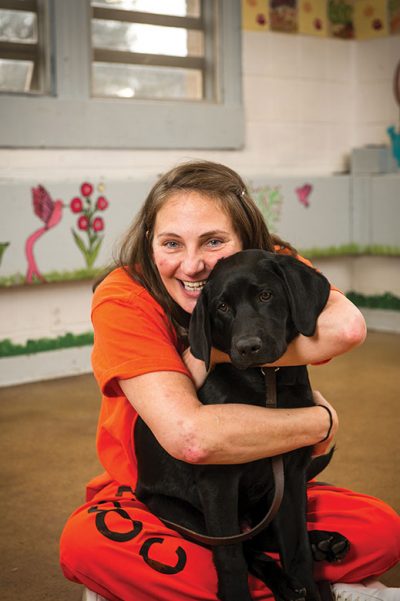
Ask inmate Debra Benigno why she went on a Salem County bank-robbery spree in 2013, and her answer is heartbreakingly simple: She did it for her poodle, Louis.
“He was ill,” says Benigno, formerly a resident of Monroeville. “When we took him to the vet, we found out he had cancer. He needed stomach surgery.” Would she have robbed the banks if she didn’t need the money for her dog’s operation? “Probably not,” she says.
Louis died never having had the surgery, but Benigno has found a way to keep up her devotion to dogs, even while serving a six-year sentence at the Edna Mahan Correctional Facility for Women in Clinton.
Benigno, 57, works with Puppies Behind Bars, a 20-year-old nonprofit that raises service dogs for wounded veterans and bomb-sniffing dogs for law-enforcement agencies. PBB is a pet cause (sorry) of celebrities like Glenn Close and Oprah Winfrey.
“I’ve always had dogs,” says Benigno from a cinderblock recreation room in Edna Mahan’s Alpha Housing Unit, where a half-dozen Labrador retrievers and 13 inmates in orange jumpsuits are in the midst of a two-hour training session. The trainers run the puppies through an obstacle course of tunnels and platforms to find hidden toys. The exercise acclimates the dogs to climbing and crawling.
PBB is based in NewYork; Edna Mahan has been its only New Jersey facility since 2001. Dogs bred for the program are brought to the prison when they’re about eight weeks old. They live among the inmates until they reach their first birthday, when they are routed to the CIA, the ATF, or another government agency for testing and additional training, if necessary. (Edna Mahan exclusively trains Labs as explosive-detection canines, a.k.a. bomb-sniffing dogs.)
If raising a puppy while serving time sounds like a cushy assignment, it is not.
“We’re up at five in the morning with them, then they’re with us all day,” says Liz Cooper, a 23-year-old from Princeton. She is serving five years in Edna Mahan for a robbery.
The dogs even sleep in kennels next to their assigned inmates, or “raisers,” at night. Raisers attend weekly training sessions with their dogs, complete homework assignments and exams, and provide daily obedience training.
Cooper’s dog, a yellow Lab named Wonder, is six months old but already looks full-grown. “She’s very high energy, and she loves to play,” says Cooper. “She’s taught me a lot about patience, trust and responsibility.”
That’s the point. To be chosen for the program, inmates like Benigno and Cooper must maintain a clean disciplinary record for more than a year and be cleared by mental-health specialists.
“When you see these women’s faces when they find out their dog makes it, that they’ve been accepted by the pros at the ATF or the CIA, you can’t believe it,” say instructor Jan Brady of Basking Ridge. “They are unbelievably proud and happy.”
The majority of the 100-plus dogs raised at Edna Mahan have gone onto bomb-sniffing work, Brady says. In 2013, in the wake of the Boston Marathon bombing, a PBB dog was dispatched to sniff along the route for further explosives. Occasionally, the dogs are put up for adoption because of health problems or because their disposition doesn’t fit the work.
Inmates like Cooper, who is scheduled for release in May, hope to follow their dogs’ lead to new horizons. “When I get out, I want to raise dogs,” says Cooper. “I’ve already written a business plan.”

This a great program! It’s been wonderful to work with these dogs, future heroes.